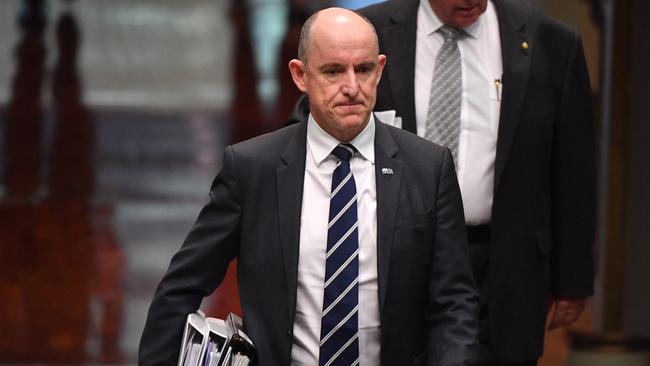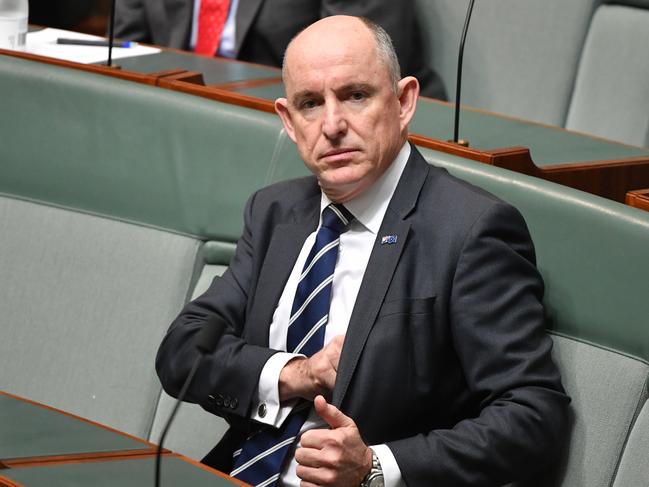Royal commission hears minister allegedly refused to apologise following robodebt criticism
An Australian minister said he would ‘double down’ instead of apologising months after concerns were raised about the robodebt scheme being unlawful, a royal commission has heard.

QLD News
Don't miss out on the headlines from QLD News. Followed categories will be added to My News.
An Australian Government Services minister said he would ‘double down’ instead of apologising months after concerns were raised about the robodebt scheme being unlawful, an inquiry into the debt recovery program has heard.
The Royal Commission into the Robodebt Scheme on Tuesday heard that Stuart Robert, then-Government Services minister – received legal advice informing and advising him that the best response was to admit the error about the scheme and apologise.
Instead, the commission heard, Mr Robert said: “We absolutely will not be doing that. We will double down.”
The unlawful Centrelink debt recovery scheme – dubbed robodebt – ran from 2015 to November 2019 and used the controversial averaging income technique, based on Australian Taxation Office records, to assess annual incomes of welfare recipients.
The program illegally garnished $720 million from 380,000 victims and culminated with a $1.8 billion settlement to hundreds of thousands of victims.
Former Department of Human Services Secretary, Renee Leon, on Tuesday told the Robodebt Royal Commission – which is taking evidence at the Pullman Brisbane King George Square hotel in Brisbane this week – of a toxic culture within her department and others.

The robodebt commission is working to establish how the illegal program came to be and kept going despite numerous red flags suggesting it was unlawful.
Professor Leon was asked about the effect various media articles criticising the robodebt scheme had, along with concerns raised in a report by Emeritus Professor of Law Terry Carney.
The Department’s legal advice was that the Robodebt methods were “defensible and reasonable”, according to documents shown to the commission.
The commission heard it was recommended that advice be sought from the Solicitor-General in March 2019, but when that advice arrived six months later, it was different from the initial advice received.
“The best course is to apologise to our customers, to admit the errors, and to inform customers and staff of the steps we will take to correct the error,” Mr Robert was advised as a result of the legal analysis, the commission heard.
“We absolutely will not be doing that. We will double down,” the then-minister responded.

“So the shock began then, but it wasn’t at that stage certain, at that stage it was a concern. It was a terrible shock to get the Solicitor-General’s advice.”
Professor Leon also detailed the toxic culture within the Department of Human Services.
“You end up with a situation where people are afraid to raise risks or say something negative because they might get humiliated or yelled at,” she said.
“So I also had to make it really clear to people … that no one would get shot for bringing me bad news, that it’s much better to tell me that there’s something going wrong because then we could fix it, rather than to hide it because you’re afraid you might get into trouble for it.”
She also spoke of ministerial interference, even though ministers were not supposed to have any say about the deployment of public servants.
“I do know what it’s like to say to the government that their idea can’t be achieved,” Professor Leon said.
“Things that would happen to people if they were seen as unhelpful would be – and I had experience of this happening to colleague secretaries – that the Minister would stop speaking to them and refuse to deal with them.
“They would know that they were completely on the outer, at least one secretary resigned in those circumstances, secretaries were told to move deputy secretaries to other roles if the minister felt that that deputy secretary was unhelpful.”

Professor Leon was also critical of the former head of the government’s Human and Social Services department, Kathryn Campbell.
“I thought that the abolition of my department, to bring it under the Department of Social Services, was probably a reward for Secretary Campbell for having been more responsive to the government than I was,” she said.
“And I thought – and I don’t think I was alone in thinking – that her elevation to the role of Secretary of the Department of Foreign Affairs and Trade was a very big reward for someone who had no background in diplomacy.
“So I think it was seen as being a reward for being very cooperative with the government. Not only probably about this (Robodebt scheme issues), but a range of matters.”
The fourth and final block of the inquiry is scheduled to continue through to March 10.
The Robodebt Royal Commission was established on August 18, 2022 to inquire into all aspects of the robodebt scheme.
The commission findings are anticipated to be handed down between April 13 to June 30.


